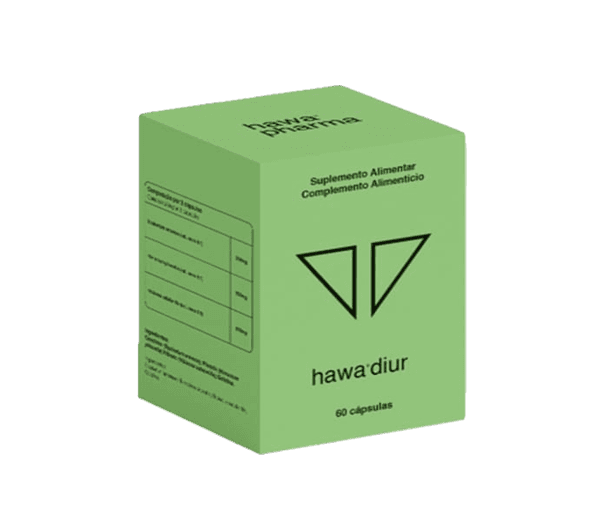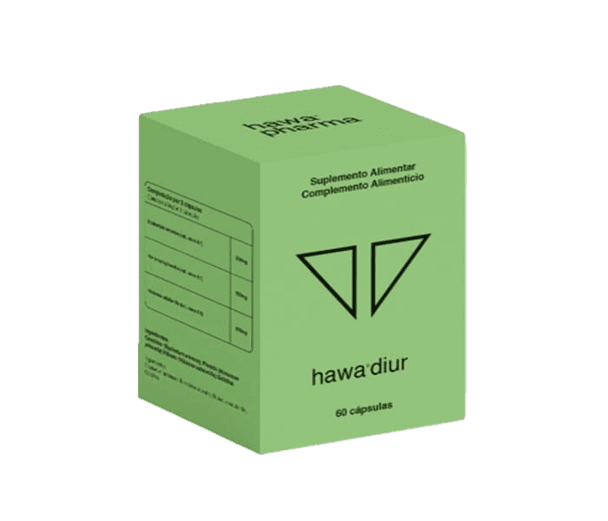Hawa Diur - Hawa Pharma
€17,91 EUR
Unit price
/
Unavailable
Hawa Diur - Hawa Pharma is backordered and will ship as soon as it is back in stock.
Description
Description
HAWA DIUR - Regulation of organic fluids.
Potassium-sparing diuretic and other elements.
There are many vegetables traditionally used to eliminate accumulated water in the body.
We selected three that exhibit the best positive synergy with each other, enhancing their overall effect. Scientific research, although scarce, on these plants was also essential in their final selection.
The phytotherapeutic plants we use act through mechanisms that increase glomerular filtration and primary urine formation,1 through an increase in renal circulation and/or osmotic processes, and are therefore also considered in traditional phytotherapeutic medicine as “blood purifiers”, a term that we can currently translate as drainage, with the elimination of catabolites that are harmful to normal cellular metabolism.
It should be noted that these vegetables only induce water elimination, not depleting the body of minerals and trace elements, especially potassium and magnesium, which is crucial for their safety. For this reason, in phytotherapy, these vegetables are called aquaretics, as opposed to the term diuretics, used for pharmaceuticals.
Some of these vegetables also have the great advantage of having remineralizing effects, as is the case with Equisetum arvense.
HAWA DIUR - Regulation of organic fluids.
Potassium-sparing diuretic and other elements.
There are many vegetables traditionally used to eliminate accumulated water in the body.
We selected three that exhibit the best positive synergy with each other, enhancing their overall effect. Scientific research, although scarce, on these plants was also essential in their final selection.
The phytotherapeutic plants we use act through mechanisms that increase glomerular filtration and primary urine formation,1 through an increase in renal circulation and/or osmotic processes, and are therefore also considered in traditional phytotherapeutic medicine as “blood purifiers”, a term that we can currently translate as drainage, with the elimination of catabolites that are harmful to normal cellular metabolism.
It should be noted that these vegetables only induce water elimination, not depleting the body of minerals and trace elements, especially potassium and magnesium, which is crucial for their safety. For this reason, in phytotherapy, these vegetables are called aquaretics, as opposed to the term diuretics, used for pharmaceuticals.
Some of these vegetables also have the great advantage of having remineralizing effects, as is the case with Equisetum arvense.
60 Capsules
Potassium-sparing diuretic and other elements.
There are many vegetables traditionally used to eliminate accumulated water in the body.
We selected three that exhibit the best positive synergy with each other, enhancing their overall effect. Scientific research, although scarce, on these plants was also essential in their final selection.
The phytotherapeutic plants we use act through mechanisms that increase glomerular filtration and primary urine formation,1 through an increase in renal circulation and/or osmotic processes, and are therefore also considered in traditional phytotherapeutic medicine as “blood purifiers”, a term that we can currently translate as drainage, with the elimination of catabolites that are harmful to normal cellular metabolism.
It should be noted that these vegetables only induce water elimination, not depleting the body of minerals and trace elements, especially potassium and magnesium, which is crucial for their safety. For this reason, in phytotherapy, these vegetables are called aquaretics, as opposed to the term diuretics, used for pharmaceuticals.
Some of these vegetables also have the great advantage of having remineralizing effects, as is the case with Equisetum arvense.
HAWA DIUR - Regulation of organic fluids.
Potassium-sparing diuretic and other elements.
There are many vegetables traditionally used to eliminate accumulated water in the body.
We selected three that exhibit the best positive synergy with each other, enhancing their overall effect. Scientific research, although scarce, on these plants was also essential in their final selection.
The phytotherapeutic plants we use act through mechanisms that increase glomerular filtration and primary urine formation,1 through an increase in renal circulation and/or osmotic processes, and are therefore also considered in traditional phytotherapeutic medicine as “blood purifiers”, a term that we can currently translate as drainage, with the elimination of catabolites that are harmful to normal cellular metabolism.
It should be noted that these vegetables only induce water elimination, not depleting the body of minerals and trace elements, especially potassium and magnesium, which is crucial for their safety. For this reason, in phytotherapy, these vegetables are called aquaretics, as opposed to the term diuretics, used for pharmaceuticals.
Some of these vegetables also have the great advantage of having remineralizing effects, as is the case with Equisetum arvense.
60 Capsules



